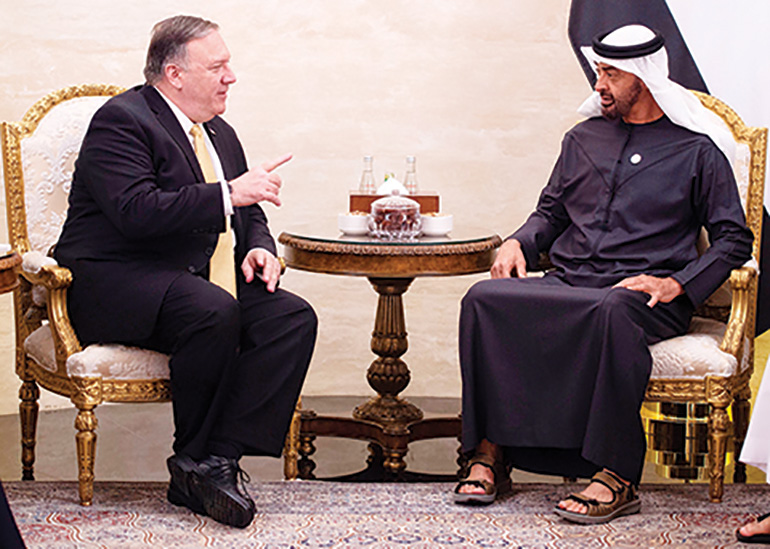

ABU DHABI:Washington's top diplomat said yesterday he was "optimistic" a waycould be found to protect Syrian Kurds while allowing Turks to "defendtheir country from terrorists" following a US pullout from Syria. "Weare confident we can achieve an outcome that achieves both of those,"Secretary of State Mike Pompeo told journalists in Abu Dhabi. The Gulf emirateis his latest stop in a regional tour aimed at reassuring allies after a shockDecember announcement by President Donald Trump that US troops would bewithdrawn from Syria.
Pompeo's remarksfollow tensions between the US and Turkey over the fate of Washington's SyrianKurdish allies in the fight against Islamic State group militants. Turkey hadreacted angrily to suggestions that Trump's plan to withdraw troops wasconditional on the safety of the US-backed Kurdish fighters, seen by theTurkish government as terrorists. US-led operations against IS in Syria havebeen spearheaded on the ground by the Kurdish-dominated Syrian DemocraticForces.
Ankara sees thebackbone of that alliance, the Kurdish People's Protection Units (YPG), as aterrorist group linked to the Kurdistan Worker's Party (PKK) which has fought adecades-long insurgency against the Turkish state. Pompeo said that Washingtonrecognized "the Turkish people's right and (Turkish President RecepTayyip) Erdogan's right to defend their country from terrorists". But, headded, "we also know that those fighting alongside of us for all this timedeserve to be protected as well". Pompeo said he had spoken to Turkey'sForeign Minister Mevlut Cavusoglu. "Many details (are) still to be workedout but I'm optimistic that we can achieve a good outcome," he said.
Multiple operationsincluding American-backed assaults have ousted IS militants from most of theswathes of Syria and Iraq they captured in 2014. But Trump's announcementraised fears of a long-threatened Turkish assault against the Kurds. OnThursday, Cavusoglu repeated that threat, telling NTV television: "If the(pullout) is put off with ridiculous excuses like Turks are massacring Kurds,which do not reflect the reality, we will implement this decision."
That came after atense meeting between Turkish officials and Trump's national security adviserJohn Bolton in Ankara, aimed at coordinating the pullout process after Boltonset conditions that appeared to postpone it indefinitely. The terms includedthe total defeat of IS - still active in some parts of Syria - and ensuringprotection for Kurdish fighters. The US-led coalition launched operationsagainst IS in Sept 2014, forming the SDF a year later with some 25,000 Kurdishfighters and 5,000 Arabs - all Syrian.
Backed by US armsand air support, the YPG-dominated group has overrun the de facto Syriancapital of IS, Raqqa, and a large part of Deir Ezzor province. But that stirredTurkish fears of a breakaway Kurdish state on its border. As well as fightingIS, the YPG has also battled pro-Ankara forces in northwestern Syria, pullingSDF forces away from the battle against jihadists in the east of the country.Trump's announcement last month prompted the YPG to call on Syrian governmenttroops to deploy alongside their own forces in the north to help counter a potentialTurkish offensive.
A spokesman forthe US military said Friday it had begun "the process of our deliberatewithdrawal from Syria". But US defense officials quickly sought to clarifythat while gear was being pulled out, "we are not withdrawing troops atthis stage". Late Friday, Pentagon spokesman Cmdr Sean Robertson said thatOperation Inherent Resolve "is implementing the orderly withdrawal offorces from northeast Syria within a framework coordinated across the USgovernment".
The withdrawal,Robertson said, "is based on operational conditions on the ground,including conversation with our allies and partners, and is not be subject toan arbitrary timeline." He added: "For purposes of operationalsecurity, we will not discuss specific troop movements or timelines. However,we will confirm that there has been no redeployment of military personnel fromSyria to date. The mission has not changed."
US defenseofficials said the withdrawal was only of certain types of gear, and nottroops. "We are not withdrawing troops at this stage," one US defenseofficial said. A second US defense official told AFP that the military hadconducted a number of preparations for a deliberate withdrawal. "Thatincludes planning for the moving of people and equipment, preparation offacilities to accept retrograde equipment," the official said, noting thatno troops had been withdrawn. The Syrian Observatory for Human Rights reportedearlier that the US-led coalition in Syria had started scaling down its presenceat Rmeilan airfield in the Hasakeh province of northeastern Syria. But thefirst defense official said this was merely part of a regular troop movement.
Democraticcongressman Adam Schiff, who chairs the House Intelligence Committee, blastedthe withdrawal plans. "The Trump Administration's foreign policy is asdeeply flawed in its conception as it is dangerously incompetent in itsexecution," Schiff said on Twitter. Though Trump has said he wants awithdrawal to be coordinated, gradual and "prudent," observers havestressed that his announcement was having the same impact as a withdrawalitself. "The damage is done," said Fabrice Balanche, a geographer andSyria expert. "On the ground, the announcement of the pullout is as ifthey were already gone."
Syria'sdevastating conflict began in 2011 with anti-government demonstrations thatwere brutally crushed, sparking a complex war involving multiple foreignmilitias and jihadist groups, as well as regional and international powersincluding the US. The withdrawal announcement had also sparked concerns amongArab states and Israel that it could open the way to growing Iranian influence.
Pompeo haspledged to "expel every last Iranian boot" from Syria, and yesterdaysought to downplay the impact of the US pullout on this goal. "The factthat a couple of thousands of uniformed personnel in Syria will be withdrawingis a tactical change," he said. "It doesn't materially alter ourcapacity to continue to perform the military actions that we need toperform." The US is looking to create an anti-Iran front - the Middle EastStrategic Alliance - bringing together Gulf countries as well as Egypt andJordan. Washington is set to convene an international summit in Poland nextmonth focusing on stability in the Middle East, including Iran's influence. -Agencies

